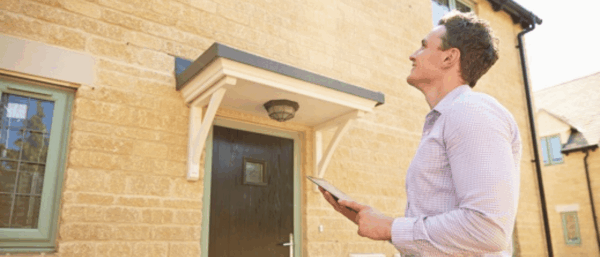The Fastest Way to Become a Residential Surveyor.

Have you done your homework and decided that residential surveying is your next career move? Whether you’re looking for an additional revenue stream, a mid-life career change, or just entering the world of work, you’ll be pleased to know that you don’t need a degree or years of experience to get started.
In fact, there are several ways to become a residential surveyor, but not all of them are created equal. If you’re keen to qualify quickly, affordably, and with job-ready skills, this guide will walk you through your options and show you why the Sava Diploma in Residential Surveying and Valuation is the UK’s leading vocational route into residential surveying.
What does a residential surveyor do?
Residential surveyors are the “house detectives” inspecting properties and providing detailed reports on their condition, often to help homebuyers make informed decisions. Some surveyors also work for housing providers or carry out valuations for mortgage lenders, insurance providers or legal proceedings.
It’s a respected profession, offering flexible work, great earning potential, and a sense of purpose. And the good news? There’s more than one way in.
Your Routes into Residential Surveying
Here’s a breakdown of the most common ways to become a residential surveyor in the UK:
1. University Degree Route
Traditionally, many surveyors start with a RICS-accredited degree in surveying or a related subject. After graduating, you’ll typically need to complete the Assessment of Professional Competence (APC) to become a Chartered Surveyor and gain the MRICS designation after your name.
Pros:
- A recognised academic pathway
- Route to chartership
Cons:
- Takes 3 – 5 years
- Can cost upwards of £27,000+ (excluding living costs)
- Less flexible – full-time study is often required
2. Surveying Apprenticeships
Apprenticeships offer a way to earn while you learn. You’ll work full-time and study part-time, often completing a degree as part of the programme.
Pros:
- No tuition fees (covered by the employer/government)
- Paid employment while you train
Cons:
- Competitive entry
- Limited flexibility in terms of employer and location
- Typically takes 3 – 5 years to qualify.
3. Sava Diploma in Residential Surveying and Valuation
If you’re looking for the fastest and most affordable way to get into the surveying profession, the Sava diploma offers a vocational route designed specifically for people wanting to retrain, gain a residential surveyor qualification, and enter the profession.
Pros:
- Designed to be completed in 24 months
- Created with career changers in mind – no degree or prior experience needed
- Provides direct entry into the Royal Institution of Chartered Surveyors (RICS) at Associate level (AssocRICS) – the level of RICS membership you need to offer RICS home surveys (Levels 1 – 3). View the RICS membership types here.
- If working as part of a firm, you can apply to the VRS (Valuer Registration Scheme) to carry out residential valuations for lending
- Accessible learning format, combining online study and virtual classrooms with practical training and face-to-face sessions
- More affordable than a university degree
Cons:
- Requires commitment and self-discipline to manage study alongside other family and work commitments
- Not approved for student loans
Comparing Your Options
| Route | Qualification | Time to Qualify | Cost | Prior Qualifications Required |
|---|---|---|---|---|
| University | BSc + APC | 3 – 5 years | £27,000+ | Yes |
| Apprenticeship | BSc (while working) | 3 – 5 years | Free – paid for by employer/government | No |
| Sava Diploma | Level 6 Diploma | 24 months | Lower cost thank university at £16,450 with flexible payment options | No |
Why choose the Sava diploma?
At Sava, we believe that talent shouldn’t be blocked by traditional barriers like degrees or long, inflexible pathways. That’s why the Diploma in Residential Surveying and Valuation was developed – to give aspiring surveyors a faster, more affordable, and practical way to enter the industry.
Whether you’re coming from construction, teaching, the military, or something else entirely, our learners come from all walks of life. The Sava diploma sets you up with the knowledge, technical skills, and confidence you need to start surveying homes professionally in as little as two years.
And because the diploma is approved by RICS, you’ll gain direct entry to AssocRICS status, helping you stand out in a competitive job market.
What’s involved in the Sava diploma?
Here’s what your journey might look like:
Step 1: Enrolment
Get started with a simple application process. No degree or prior experience required. Simply speak to a Sava course advisor to kickstart your journey.
Step 2: Training Phase
Study part-time with online modules, supported by face-to-face practical training delivered by surveyors who are renowned in their fields (some have even authored Sava’s course textbooks).
Step 3: Assessment and Portfolio of Evidence
Complete a number of set assignments and build your portfolio of evidence. This will include a number of case studies comprising condition surveys, valuation reports and reflective accounts.
Step 4: Qualify and Progress
Achieve the Level 6 Diploma in Residential Surveying and Valuation, gain AssocRICS status, and if you’re interested in undertaking valuation work, apply for VRS.
Step 5: Choose How You Work
Pursue employment with a corporate surveying firm, small to medium-sized business, housing provider or set up independently.
Ready to start your surveying journey?
If you’re looking for a hands-on, accessible and cost-effective way to retrain into a well-respected profession, the Sava Diploma in Residential Surveying and Valuation could be your perfect next step. To find out more about the course, payment options, and upcoming enrolment dates, visit www.sava.co.uk or get in touch with our friendly team of course advisors.